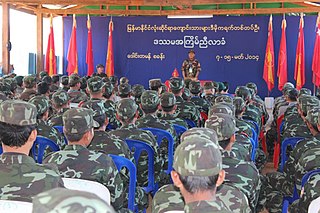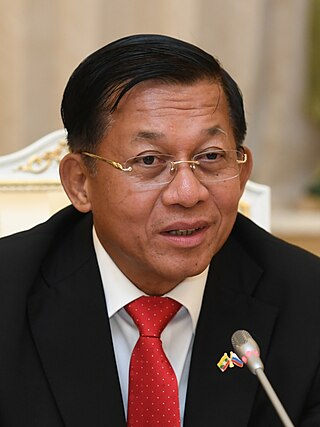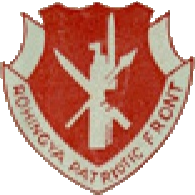
Myanmar, officially the Republic of the Union of Myanmar, also known as Burma, is a country in Southeast Asia. It is the largest country by area in Mainland Southeast Asia and had a population of about 54 million in 2017. It is bordered by Bangladesh and India to its northwest, China to its northeast, Laos and Thailand to its east and southeast, and the Andaman Sea and the Bay of Bengal to its south and southwest. The country's capital city is Naypyidaw, and its largest city is Yangon.

The Rohingya people are a stateless Indo-Aryan ethnic group who predominantly follow Islam and reside in Rakhine State, Myanmar. Before the Rohingya genocide in 2017, when over 740,000 fled to Bangladesh, an estimated 1.4 million Rohingya lived in Myanmar. Described by journalists and news outlets as one of the most persecuted minorities in the world, the Rohingya are denied citizenship under the 1982 Myanmar nationality law. There are also restrictions on their freedom of movement, access to state education and civil service jobs. The legal conditions faced by the Rohingya in Myanmar have been compared to apartheid by some academics, analysts and political figures, including Nobel laureate Bishop Desmond Tutu, a South African anti-apartheid activist. The most recent mass displacement of Rohingya in 2017 led the International Criminal Court to investigate crimes against humanity, and the International Court of Justice to investigate genocide.

Operation Dragon King, officially known as Operation Nagamin in English, was a military operation carried in 1978 out by the Tatmadaw and immigration officials in northern Arakan, Burma, during the socialist rule of Ne Win.
Insurgencies have been ongoing in Myanmar since 1948, the year the country, then known as Burma, gained independence from the United Kingdom. The conflict has largely been ethnic-based, with several ethnic armed groups fighting Myanmar's armed forces, the Tatmadaw, for self-determination. Despite numerous ceasefires and the creation of autonomous self-administered zones in 2008, many armed groups continue to call for independence, increased autonomy, or the federalisation of the country. The conflict is the world's longest ongoing civil war, having spanned more than seven decades.

The All Burma Students' Democratic Front is an opposition group in Myanmar. It was founded on 1 November 1988, after the 8888 protests in Yangon. The group's leadership consists mostly of former student exiles.
Mujahideen, or Mujahidin, is the plural form of mujahid, an Arabic term that broadly refers to people who engage in jihad, interpreted in a jurisprudence of Islam as the fight on behalf of God, religion or the community (ummah).

The Communist Party of Burma (CPB), also known as the Burma Communist Party (BCP), is a clandestine communist party in Myanmar (Burma). It is the oldest existing political party in the country.

The Rohingya conflict is an ongoing conflict in the northern part of Myanmar's Rakhine State, characterised by sectarian violence between the Rohingya Muslim and Rakhine Buddhist communities, a military crackdown on Rohingya civilians by Myanmar's security forces, and militant attacks by Rohingya insurgents in Buthidaung, Maungdaw, and Rathedaung Townships, which border Bangladesh.

Min Aung Hlaing is a Burmese army general who has ruled Myanmar as the chairman of the State Administration Council since seizing power in the February 2021 coup d'état. He took the nominally civilian role of prime minister of Myanmar in August 2021. He has led the Tatmadaw (military), an independent branch of government, as the commander-in-chief of Defence Services since March 2011, when he was handpicked to succeed longtime military ruler Than Shwe, who transferred leadership over the country to a civilian government upon retiring. Before assuming leadership over the Tatmadaw, Min Aung Hlaing served as Joint Chief of Staff from 2010 to 2011.

Myanmar–Pakistan relations refers to the bilateral relationship between the Republic of the Union of Myanmar and the Islamic Republic of Pakistan. Myanmar and Pakistan maintain diplomatic and trade relations.

The Rohingya Solidarity Organisation (RSO) is a Rohingya insurgent group and political organisation. It was founded in 1982 following a large scale military operation conducted by the Tatmadaw. The group discontinued its armed rebellion in 1998 but rearmed itself following the 2021 Myanmar coup d'état.

The Arakan Liberation Army is a Rakhine insurgent group in Myanmar (Burma). It is the armed wing of the Arakan Liberation Party (ALP). The ALA signed a ceasefire agreement with the government of Myanmar on 5 April 2012.

The Rohingya Patriotic Front (RPF) was a political organisation headquartered in Cox's Bazar, Bangladesh. The RPF had a small and poorly armed insurgent army of 70 fighters, who were active along the Bangladesh–Burma border and in northern Arakan, Burma. The goal of the RPF was to create an autonomous Muslim zone for the Rohingya people.

The National United Party of Arakan (NUPA) is a political organisation and insurgent group in Rakhine State, Myanmar. It was formed in 1994 as a merger between four nationalist groups, including a faction of the Communist Party of Arakan.

The Arakan Rohingya Salvation Army (ARSA), formerly known as Harakah al-Yaqin, is a Rohingya insurgent group active in northern Rakhine State, Myanmar. According to a December 2016 report by the International Crisis Group, it is led by Ataullah abu Ammar Jununi, a Rohingya man who was born in Karachi, Pakistan, and grew up in Mecca, Saudi Arabia. Other members of its leadership include a committee of Rohingya émigrés in Saudi Arabia.
Violent clashes have been ongoing in the northern part of Myanmar's Rakhine State since October 2016. Insurgent attacks by the Arakan Rohingya Salvation Army (ARSA) have led to sectarian violence perpetrated by Myanmar's military and the local Buddhist population against predominantly Muslim Rohingya civilians. The conflict has sparked international outcry and was described as an ethnic cleansing by the United Nations High Commissioner for Human Rights. In August 2017, the situation worsened and hundreds of thousands of refugees fled Myanmar into Bangladesh, with an estimated 500,000 refugees having arrived by 27 September 2017. In January 2019, Arakan Army insurgents raided border police posts in Buthidaung Township, joining the conflict and beginning their military campaign in northern Rakhine State against the Burmese military.
Harkat-ul-Jihad-al-Islami Bangladesh, [transl. Jihad movement of Islam of Bangladesh] is the Bangladeshi branch of the terrorist group Harkat-ul-Jihad-al-Islami (HuJI). It is banned in Bangladesh and is a Proscribed Organisation in the United Kingdom under the Terrorism Act 2000.
Events in the year 2022 in Myanmar.












